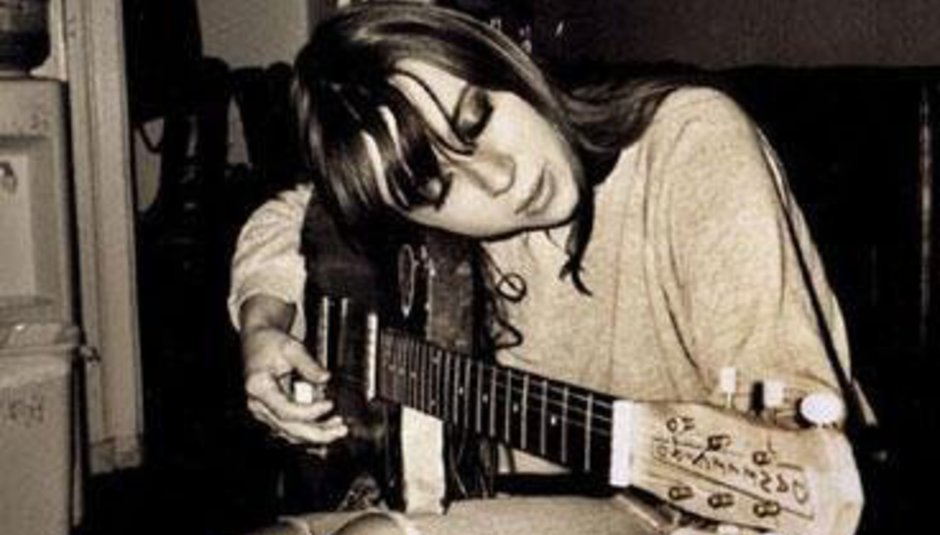Dear Sir (1995) & Myra Lee (1996)
It’s amazing to think that an artist who was making this kind of tuneless stripped-down post-hardcore music, fifteen years ago, would end up on Jools Holland. It also sounds a little implausible that Chan Marshall was spotted by Tim Foljahn and Steve Shelley (of Sonic Youth) having been coerced by friends to play her first ever solo-set, when she “couldn’t play at all”, but in fact she’d been in a few noise bands, in Atlanta GA, and opened for Liz Phair, then at the peak of her critical acclaim. Back in 1994, Chan Marshall had only just arrived in New York, and played a few experimental / improvisational gigs in warehouses that were mostly an excuse to take drugs (says she); nonetheless, she was learning her craft, namely – putting more emotion into one moan than most singers get into a whole album, and more into one fumbled chord than a whole progression, elegantly played.
Journalists like to quote Marshall verbatim, and re-tell her story as if she ran away from an abusive home in the deep South, late one night, and took her nom de guerre from a sticker on a truck that read CAT Power, before falling in with a gang of troubadours (like Mick Travis in O Lucky Man!). The move seems to have been more gradual (whatever the final straw might have been), but it’s an emotional truth that she continued to feel that isolated, even after she’d found a supportive network of bands (let alone one band). Even after a hiatus that could have turned into retirement, in 2002 she was able to pick up Eddie Vedder and Dave Grohl as members of her backing band (credited as EV and DG, respectively), having called in the Dirty 3 to help her lose the lo-fi tag, a few years before. True, the first three releases are lo-fi, but largely because distortion and feedback are desired textures.
Myra Lee (1996) was named for Chan Marshall’s mother, and recorded on the same day as Dear Sir (1995), meaning that you have to wonder whether the pair are somehow letters home. If so, you can see why she left in such a hurry, and why the earlier record is so much more difficult. On ‘Great Expectations’ Chan mumbles hopelessly about being “in the desert” and surrounds herself with distortion to create a menacing atmosphere. Similar to Low’s ‘Prisoner’, from the same period, it’s one of the bleakest things she’s ever written. Whereas Codeine juxtaposed enfeebled vocals with pummelling rhythms and stark melodies, in a way that personified depression, or made it a struggle, there’s no sense of Chan having any possible escape from this solid, geometrical prison. In a similar mood, ‘We all die’ manages the weird trick of suggesting total, horrific stasis, whilst playing a rapidly descending bassline. It’s possible that her boyfriend, Bill “Smog” Callahan had introduced her to Jandek, being a fan, because this is close to his own sound from the time, but it’s also possible that Marshall was trapped in the same near-psychotic fog of despair as the reclusive Sterling R Smith.
What would the community think? (1996)
In indie terms, Community was Cat Power’s breakthrough album, with a minor hit in the form of ‘Nude as the News’ – a cryptic anthem whose tight riff burst into sparks of jagged lead guitar, and whose lyric seemed to identify Jesse Jackson as more than just a charismatic preacher; more like a prophet, wielding the Hand of God (“I’ve got the sun in me!” or is that “I’ve got the Son in me!”?) Half the songs seemed to be built around the simple riffs of hardcore, but the other half were delicate, drifting soundscapes built up from almost randomly grazed keys and strings, heavily reverbed. Of these, ‘Taking People’ concludes with pretty (albeit shagged out) pedal steel, to resolve its vague lament.
It’s on her third album (The Covers Record being her fifth) that Chan really showed her promise as a great interpreter. Appearing as the opener on Smog’s Wild Love album, ‘Bathysphere’ had been Bill Callahan’s own first flash of genius (after two tapes of noise, and two collections of much rougher, and dark humoured sketches). Unsurprisingly, the Cat Power version does it justice, since it’s a variation on Sylvia Plath’s “Bell Jar” metaphor, with added absurdity. The song opens: “When I was seven / I said to my mother / ... / I want to live in a bathysphere…” and then sees the precocious young child being lowered beneath the waves, to explore the depths, but also renounce the safe, ordinary world. The song and its lyrics are a good fit for her, because Chan was already using repetition in her lyrics to create horrible tension, before any kind of semantic/narrative resolution. Callahan’s words (“if the water should cut my line / if the water should cut my line…”) that take so long to say what happen next, echo many of her own, and they’d both continue in this vein, well after a morose relationship that seems to be reflected in his own ‘Goldfish Bowl’ (but hopefully not ‘Be Hit’ – as in: “every girl I’ve ever loved / has wanted to be hit…”). In place of Callahan’s squelching horns, Marshall uses squiggly pre-programmed noises like the randomly bleeping console of a B-movie spaceship; it should be naïve and facetious, but the mindlessness of the repetition adds to the oppressive atmosphere.
Of all the songs, ‘Good clean fun’ (track 2) represents the clearest connection between Cat Power’s hardcore and soul influences, showing that Chan Marshall, Soul-singer, was always there in embryo. With no real sense of forward motion, a simple riff unfolds on an electric guitar, turned up loud so you can hear the metallic tones of the strings, and at the completion of each cycle, seems to have come to a purposeless halt, with no guarantee of resuming. Given the abstraction of the lyrics, we’re in the dark with her, unable even to name what she thinks, hopes, or fears, until she’s run through a certain number of repetitions to clear her head: “After this there will be / after this there will be no more / after this there will be no more / good clean fun”. The good things in her world, as she sketches it out, are songs, and “beautiful dresses”, but the repetitions let you imagine all that’s unsaid: is “this” a first intimation of mortality, or the violence in sex, or the inevitability of being objectified in those “beautiful dresses”? As the chords and tempo changes, Chan struggles to convince herself that she can find a moral framework to explain what’s happened, and recover the romantic expectations promised by music: “all that whole time I was tested / nobody does it better / baby you’re the best”. (Yes, that is an interpolation from 'The Spy Who Loved Me'). Small hope, true, but some hope, which continues through the dazed and innocent wonderment of the next song, whose only lyrics are a childish “you are so… beautiful”.
For all this emotional back and forth, the very last song suggested it would take a long time to work through the trauma of the past, as the main riff and lachrymose vocals are crowded out by a pair of male and female speakers, muttering separate narratives you’d expect to find on Slint's Spiderland, or many a post-rock record. You feel like you’re sharing the experience of the young-Chan thinking If only she could understand what they’re saying, in the room downstairs, talking at cross-purposes, as she half-sings / half-moans: “father said he’d give me something / he gave me hate / father said he’d give me something / he gave me hate / Mother, don’t stare…”
Moonpix (1998), and beyond
For her fourth album, Moonpix (1998), Chan recruited two-thirds of the Dirty 3 – although violinist Warren Ellis appears on You Are Free (2003). The themes and tempo would remain roughly the same, but a certain jazziness, or exploratory tendency to the music suggested that Chan was gradually moving away from catharsis, and the riffs rarely resembled the bluntness of hardcore, except perhaps on 'X-Bones Style' with its telling lyric: "you have / seen some / unbe- / lieve-a / -ble things / ... / CHORUS: Oh come, child / in a X-bones style... / Come child... / come and rescue me...".
Fame helped little in the short term, and everyone has their Cat Power gig story (at the Reading Festival, shushing the nu-metal band playing in the distance, before retreating…); still, with that first Covers Record she was starting to discover something positive in the past, and much as we miss her music, she was starting to get away.






















